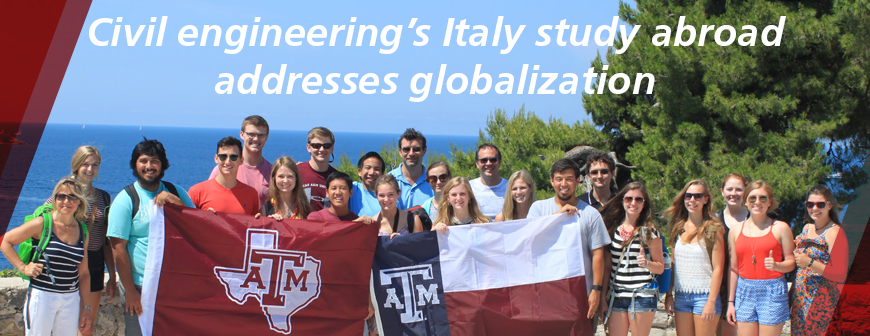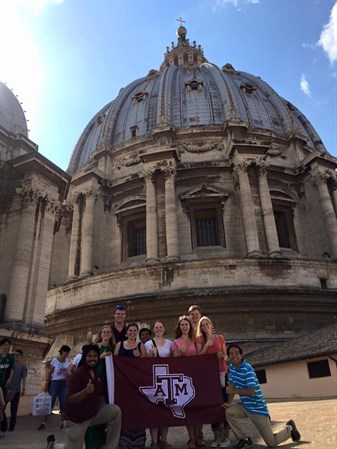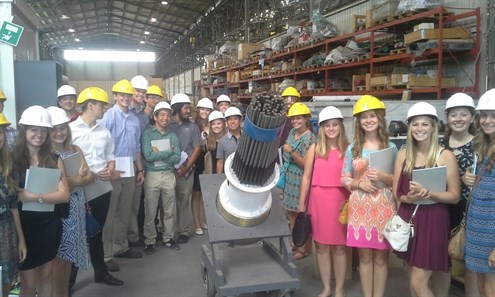
 This past summer Drs. Ivan Damnjanovic and Luca Quadrifoglio of the Zachry Department of Civil Engineering at Texas A&M University led the first study abroad Italy trip for the civil engineering department. Students benefitted from their faculty leaders’ backgrounds, as Quadrifoglio is a native of Trieste and Damnjanovic spent much of his childhood summers in the Istria Peninsula.
This past summer Drs. Ivan Damnjanovic and Luca Quadrifoglio of the Zachry Department of Civil Engineering at Texas A&M University led the first study abroad Italy trip for the civil engineering department. Students benefitted from their faculty leaders’ backgrounds, as Quadrifoglio is a native of Trieste and Damnjanovic spent much of his childhood summers in the Istria Peninsula.
“We want students to know you don’t need to speak the language in order to work abroad,” said Damnjanovic. “We see a huge industry need for engineers willing to work abroad. Once they become comfortable with this and see it as an opportunity, they are groomed to be mentors to the new generation of engineers. That’s globalization.”
Guilty of passing up an opportunity to do undergraduate research abroad, Quadrifoglio has a personal motive for wanting to help give students a push in the right direction and open more chances for exciting jobs.
“There is a fear to step out of your own environment and culture,” said Quadrifoglio. “The shock students receive is a pleasant one, because our trip goes beyond civil engineering. We have classes and a technical visit, but it’s really about a barrier that needs to be broken down so they can embrace cultural differences and see working abroad as a possibility for them.”
The number of students traveling with the two faculty members was 20. Students remarked that the smaller group really added something more to the trip. After a month with each other, deep bonds were made between the students, as well as with the faculty.
"Our trip was by far the best experience of my life. Given the opportunity to do this again, there is no doubt I would return for round two," said Katarina Bertlshofer, a junior civil engineering major. "Getting to see firsthand other cultures and lifestyles was very eye opening and definitely a life changing experience. Through this program, I formed relationships unlike any other. Without the professors, the trip definitely would not have been as spectacular as it was. They did so much with us and were constantly giving us suggestions for how to spend our free time."
Included in the program were cultural visits to Trieste, Venice, and Rovinj in Croatia, and a technical visit to De Eccher, a large international civil engineering firm. Students were also encouraged to utilize the free weekend as a personal excursion to destinations nearby, like Austria or Rome. 
“You definitely gain confidence to travel abroad and see the possibility of working abroad as an option,” said Andrew Creighton, a junior civil engineering major. “With the free weekend, we had the opportunity to put together our own trip. Our group went to Austria, and we planned it all.”
The four-week program was based in Trieste, not far from Venice. A typical class day was three to four hours of class and two to three hours of directed study homework time. The Dipartimento di Ingegneria e Architettura of the University of Trieste, and specifically Dr. Raffaela Cefalo, associate professor and coordinator of the Erasmus Program, provided essential help with the arrangements for classroom, labs, technical tours and excursions. Some of their students were invited to attend our classes to facilitate cultural exchange and interaction.
“Studying abroad in Trieste was a fun way to get those classes and helped me gain a better understanding of how foreign students may feel coming to study here,” said Rachael King, a junior civil engineering major. “At first, the language difference was very difficult for me to handle, but after a few days, I got the hang of it and was able to get my point across when I needed to. I now realize how challenging it may be for foreign students to be so far from home. I’ll now try harder to help them and make them feel welcome.”